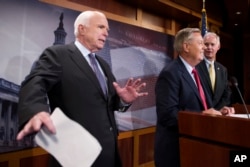U.S. Senator John McCain has announced he cannot “in good conscience” vote for the Republican health care overhaul, meaning the GOP is unlikely to be able to repeal and replace Obamacare by Sept. 30.
McCain joins two other Republicans who have pledged to vote no: Senator Rand Paul of Kentucky and Senator Susan Collins of Maine. Without those three votes, Republicans in the Senate will not have enough support to pass their health care bill.
McCain said in a statement Friday that he could not support the bill without “knowing how much it will cost, how it will [affect] insurance premiums, and how many people will be helped or hurt by it.”
Not enough time
The Congressional Budget Office, a nonpartisan agency, is evaluating the bill, but will not be able to finish its work by Sept. 30. The CBO examines the cost and economic consequences of proposed legislation.
McCain noted in his statement that he opposes the bill even though it is sponsored by his friend Lindsey Graham.
“I take no pleasure in announcing my opposition,” McCain said. “The bill’s authors are my dear friends, and I think the world of them. I know they are acting consistently with their beliefs and sense of what is best for the country. So am I.”
President Donald Trump singled out McCain during a speech at a campaign rally Friday night.
“McCain, his last campaign was all about repeal and replace!” Trump said. “So he’s decided to do something different, and that’s fine.”
Later in the speech, Trump joked about Senate candidate Luther Strange taking McCain’s place in the Senate. “Wouldn’t it be ironic if he took John McCain’s place?” Trump said. “That would be very ironic.”
Vote is unsure
It is not clear yet whether the Senate will go ahead with a vote before Sept. 30, which is the deadline for Republicans to pass the legislation with a simple majority of 51 votes. After that date, 60 votes would be required to advance the health care legislation. There are 52 Republicans in the Senate.
Senate Majority Leader Mitch McConnell has said he will only call for a vote if the bill is assured of having enough support to pass.
The bill would send block grants of federal money to the country’s 50 states and allow them to shape independent health care plans for the poorest people in their states, rather than having Washington officials allocate the money, as is now the case.
Numerous Democratic critics of the proposal, along with several major health care groups in the country, say that over the coming years the change in the law would cut millions of people from the insurance rolls.
Earlier versions opposed
Millions more Americans have been able to secure insurance to help pay their health care bills under Obamacare, but Republicans revile it, partly because almost all workers have been forced to buy insurance coverage or pay a penalty if they did not.
It was McCain’s vote in July that defeated the previous health care proposal. McCain showed up to cast his vote despite undergoing surgery for a brain tumor just days earlier.






